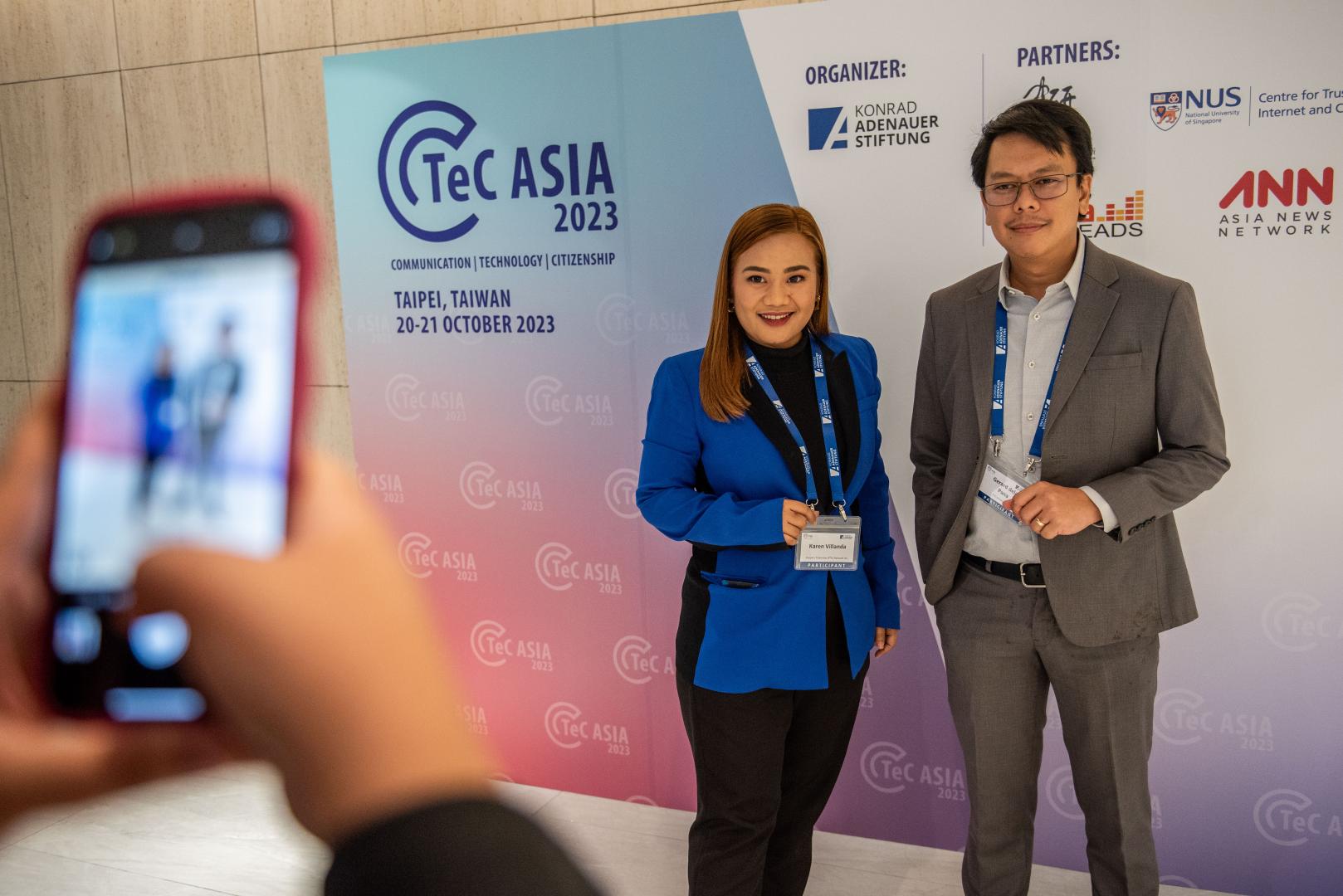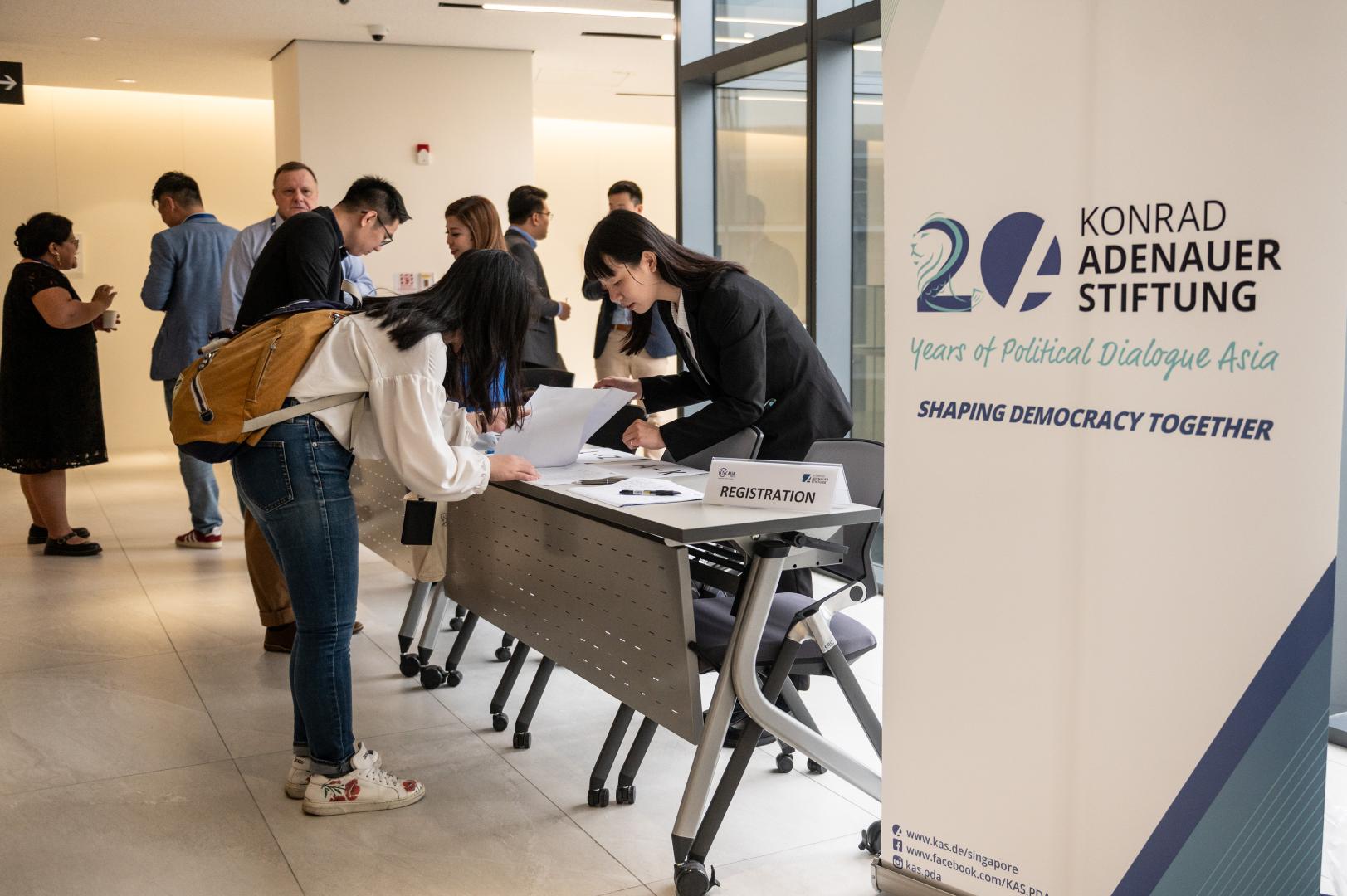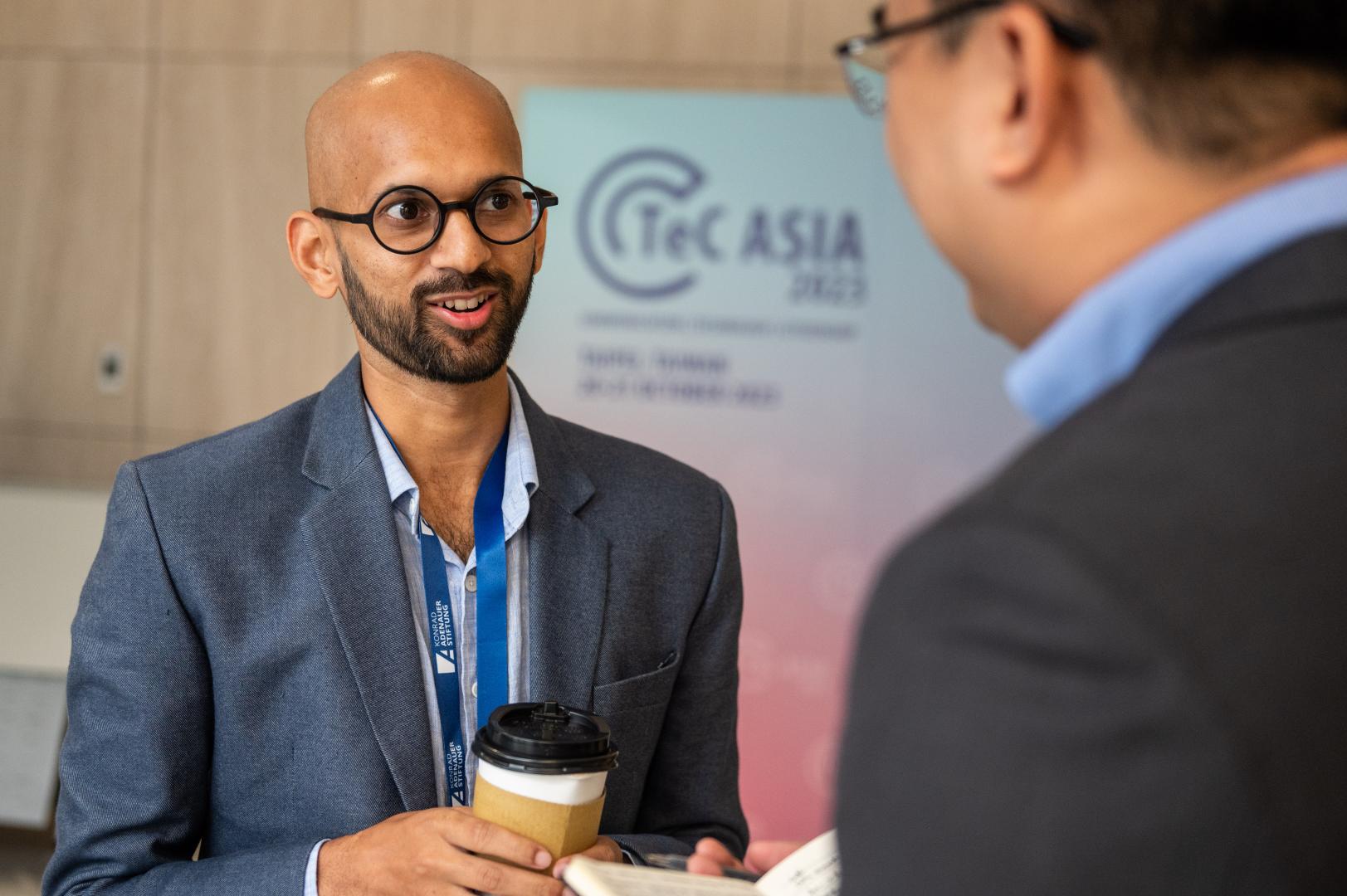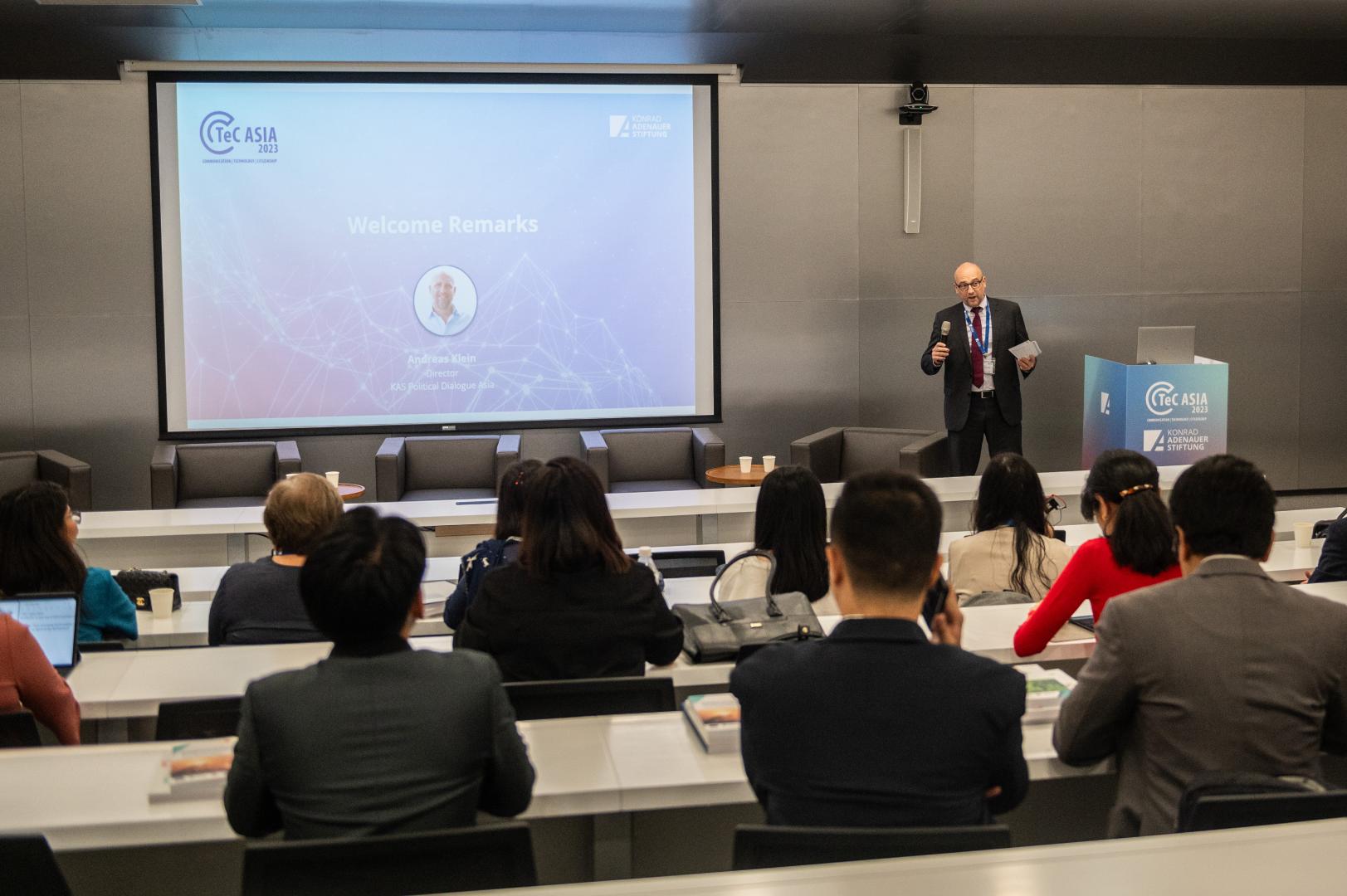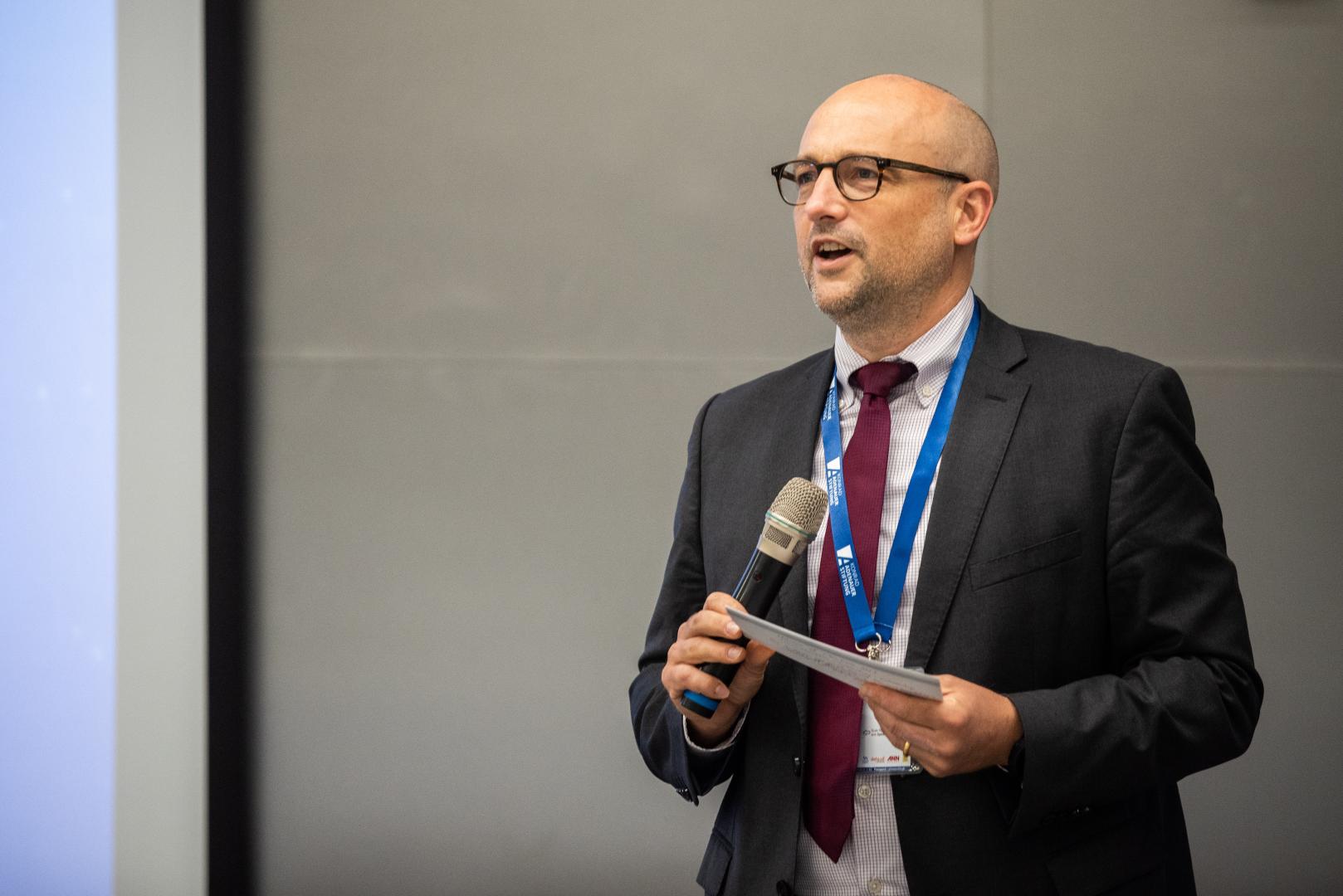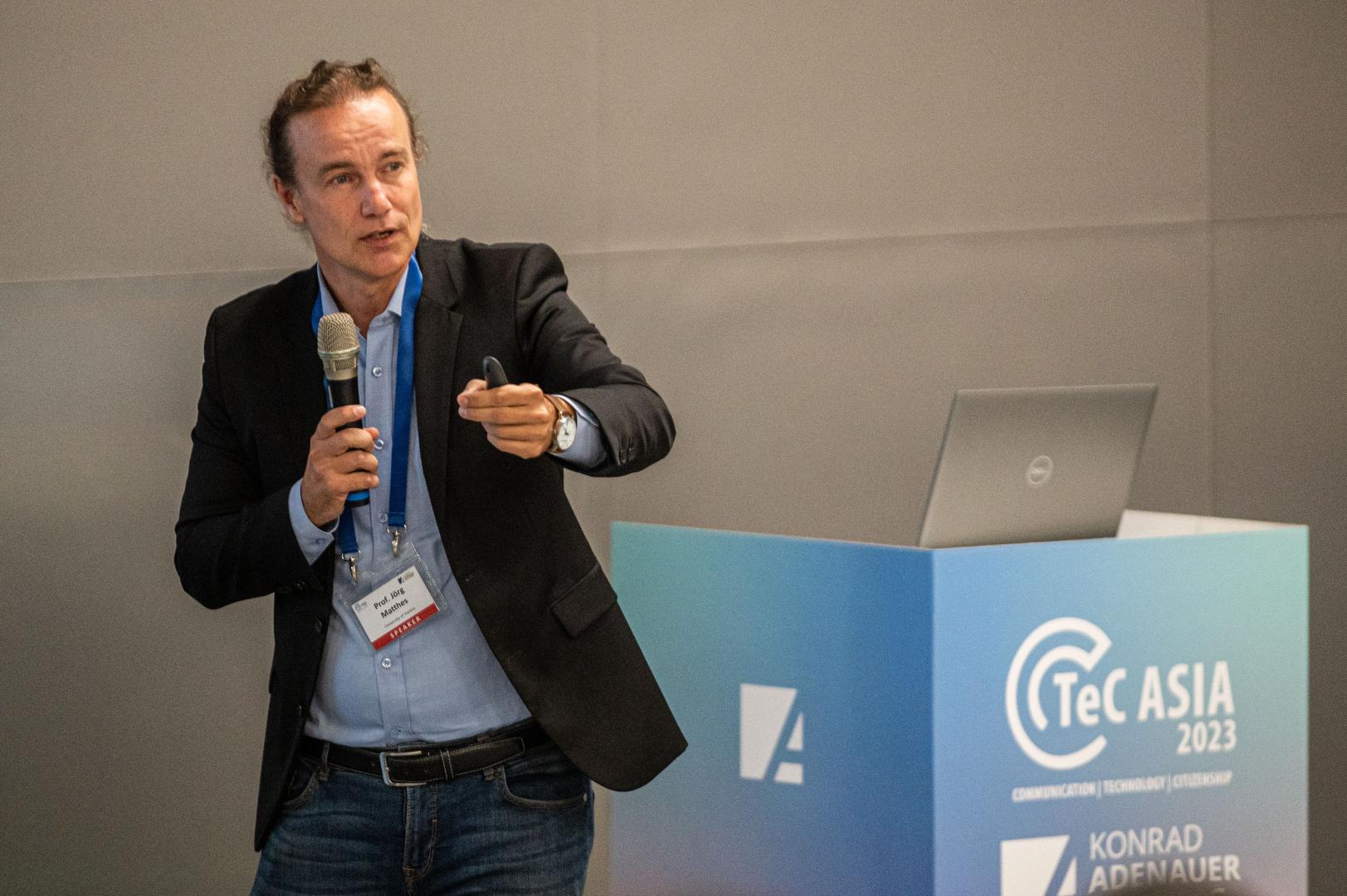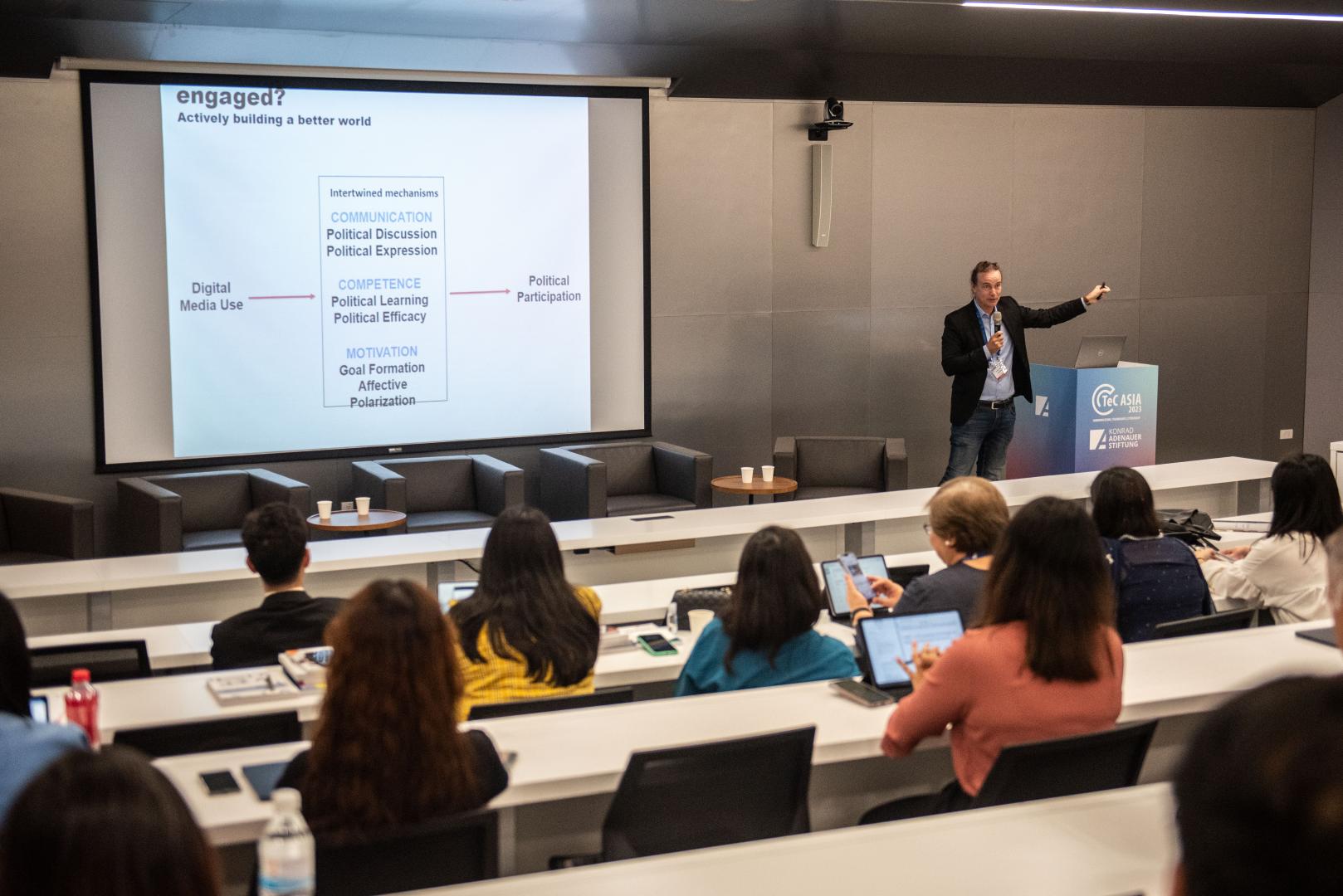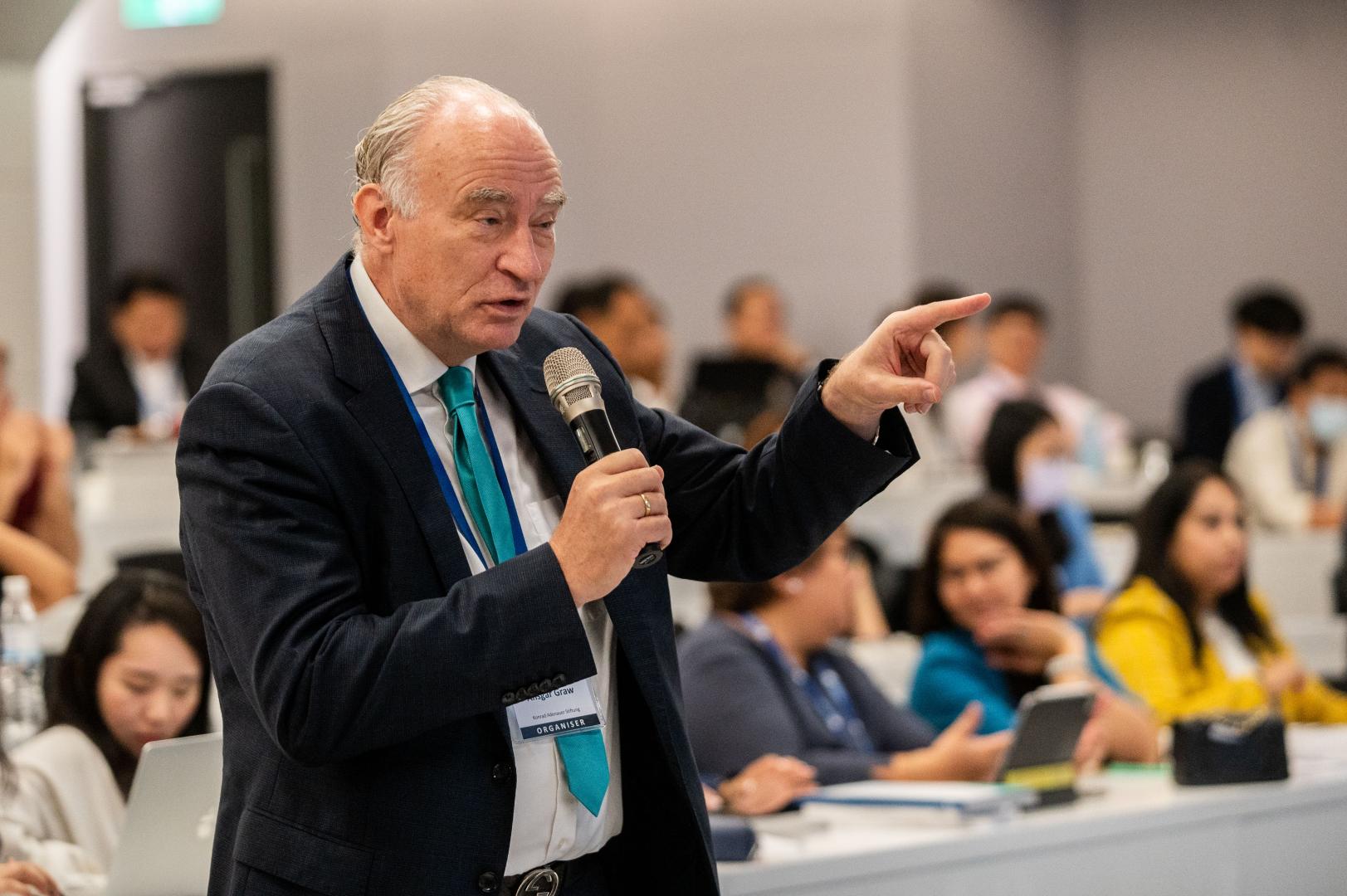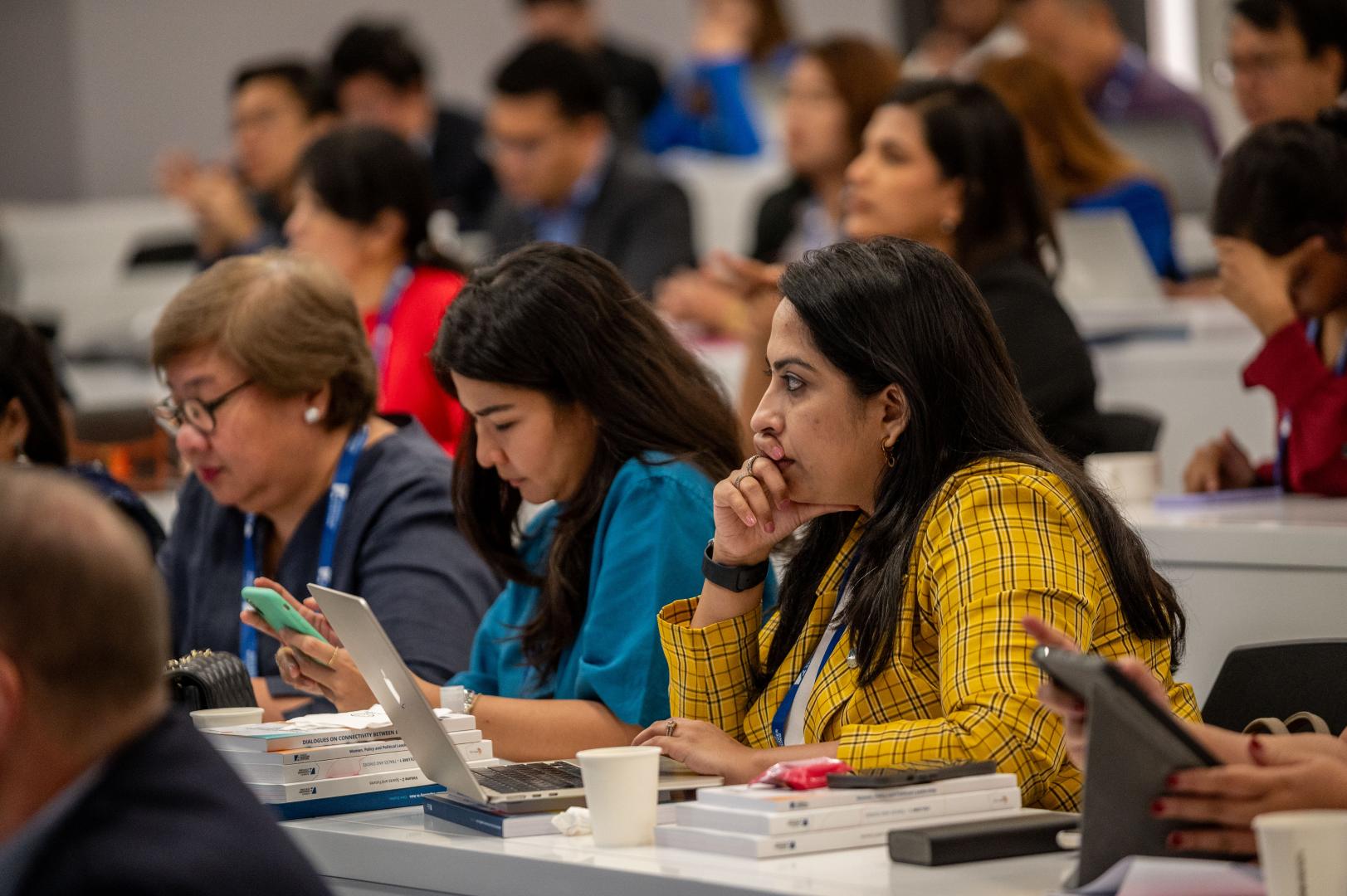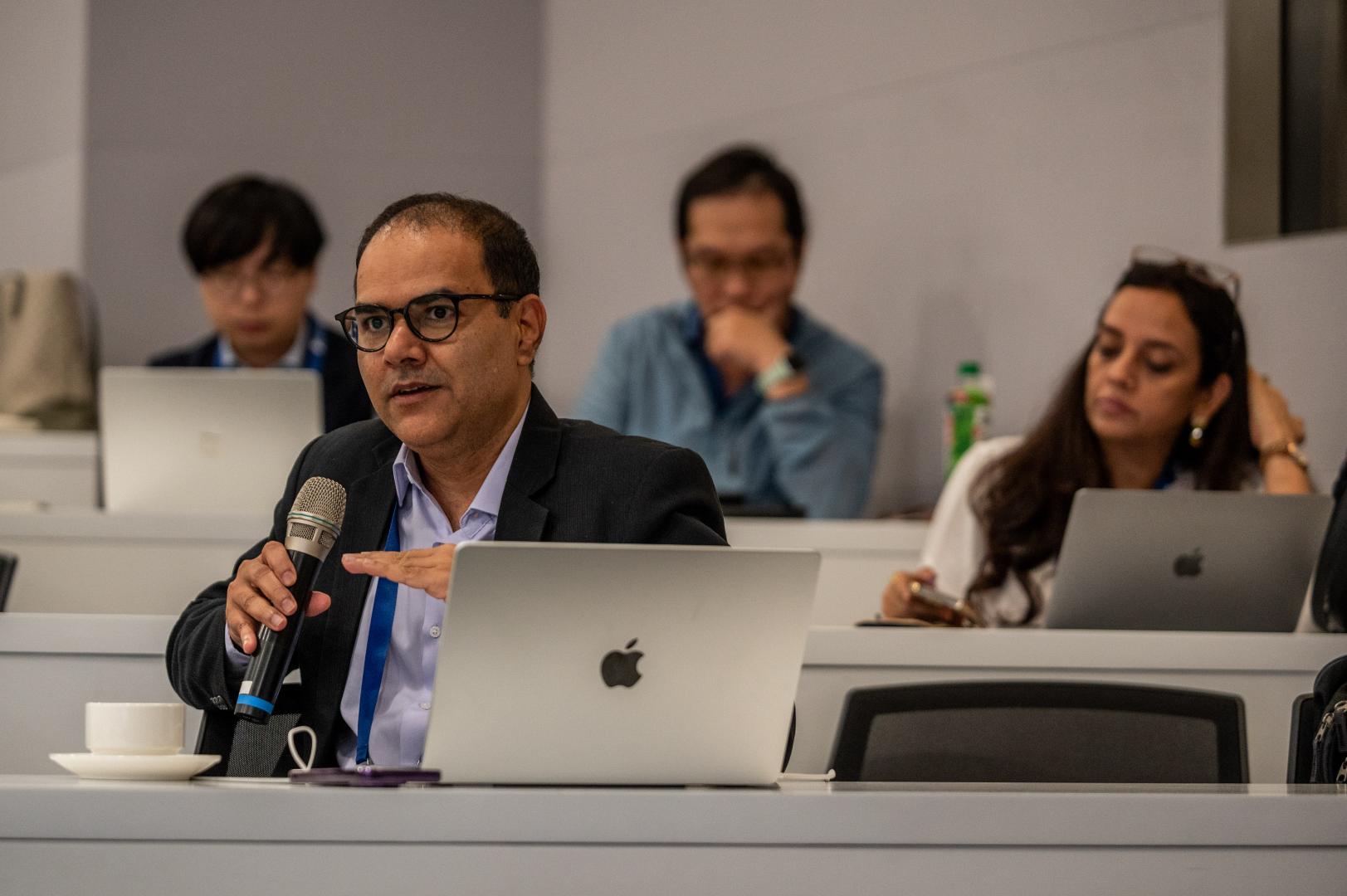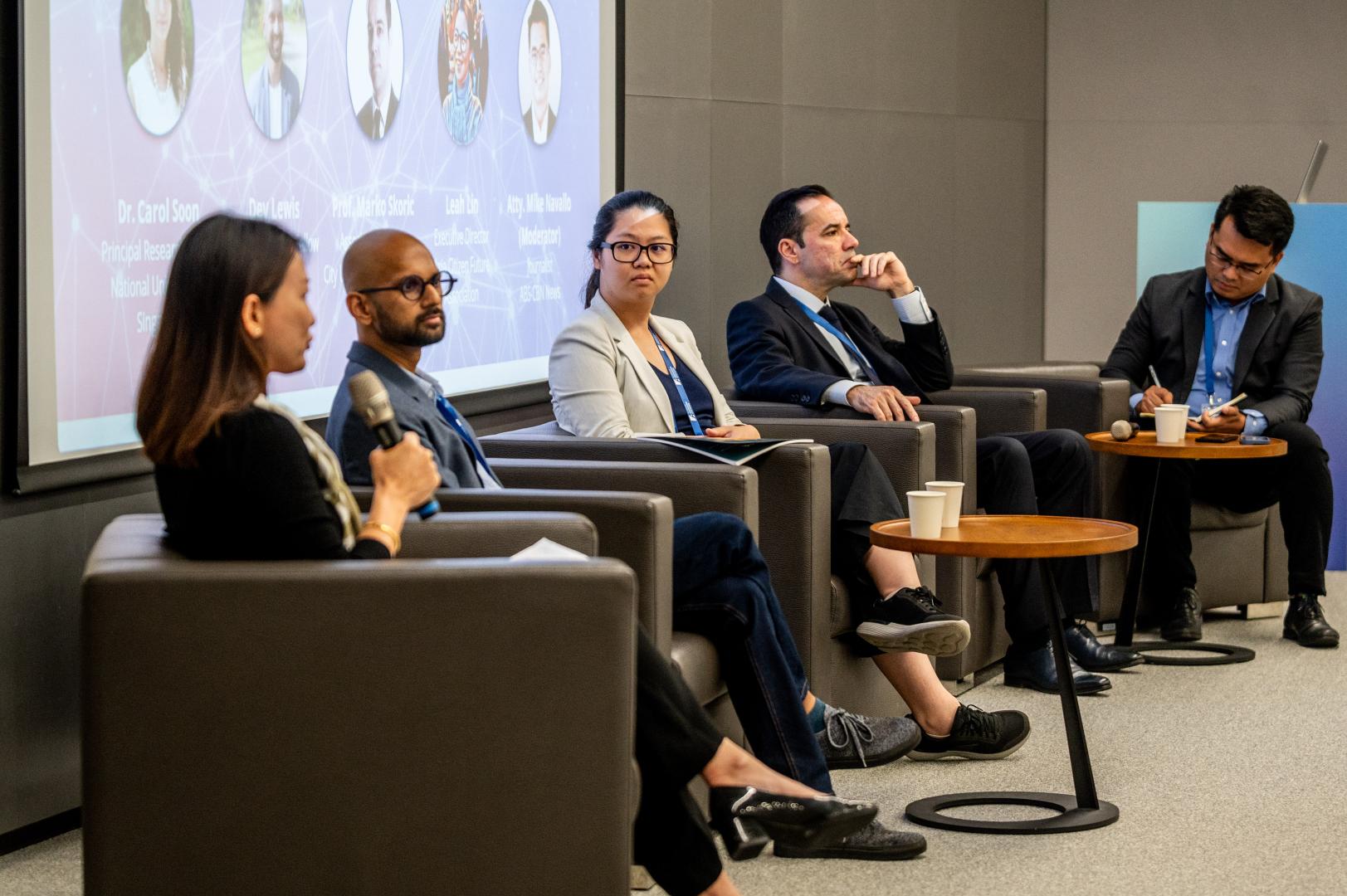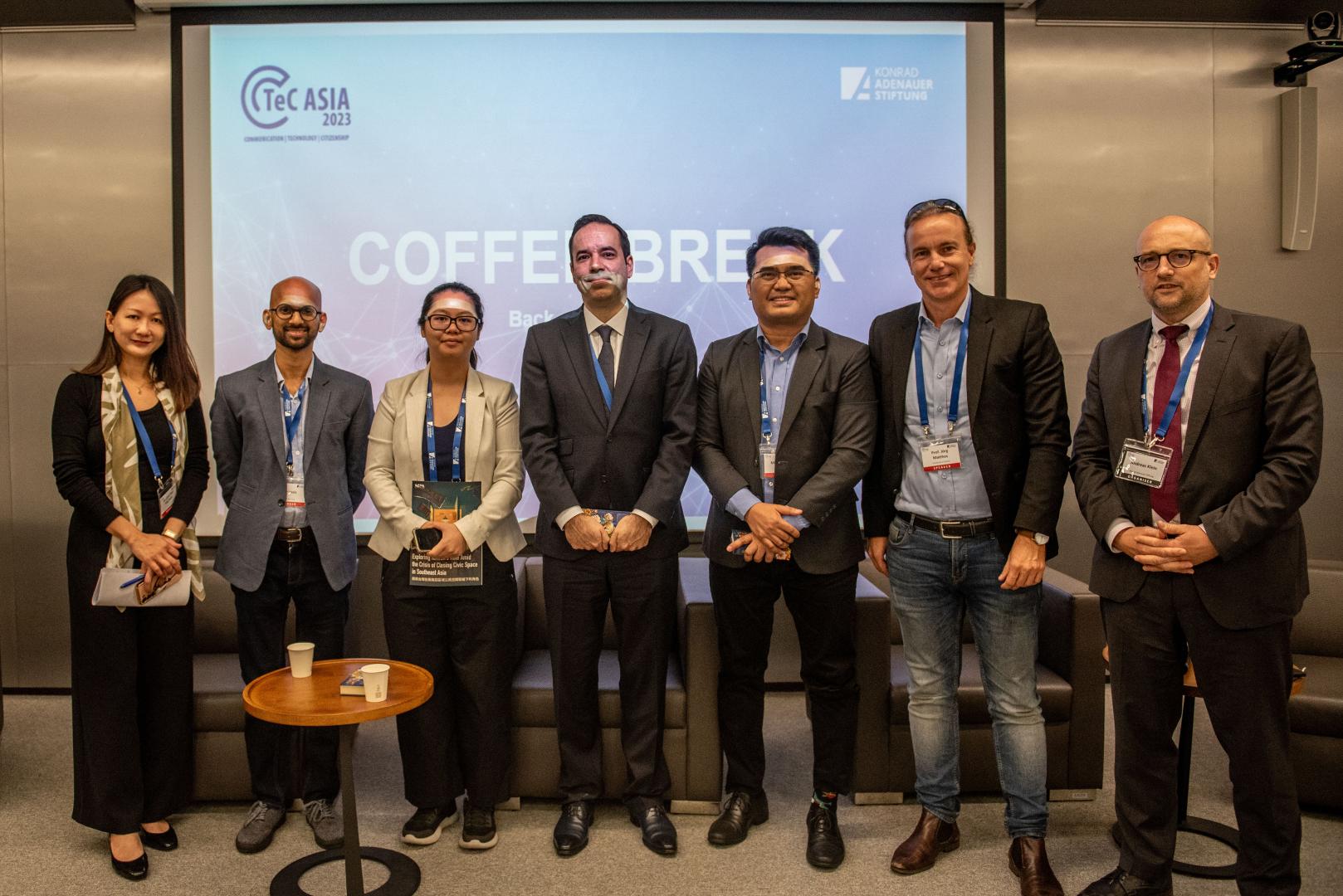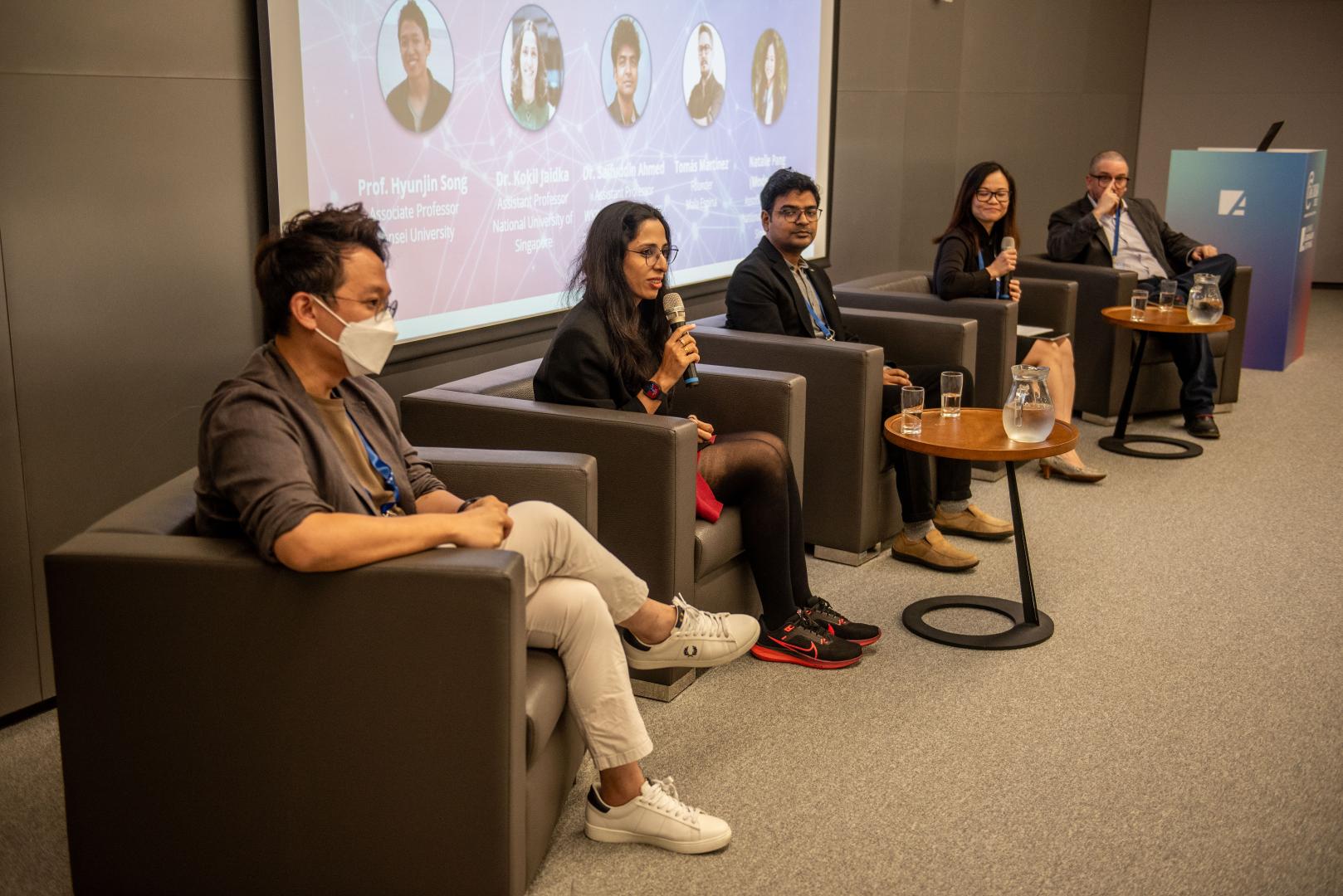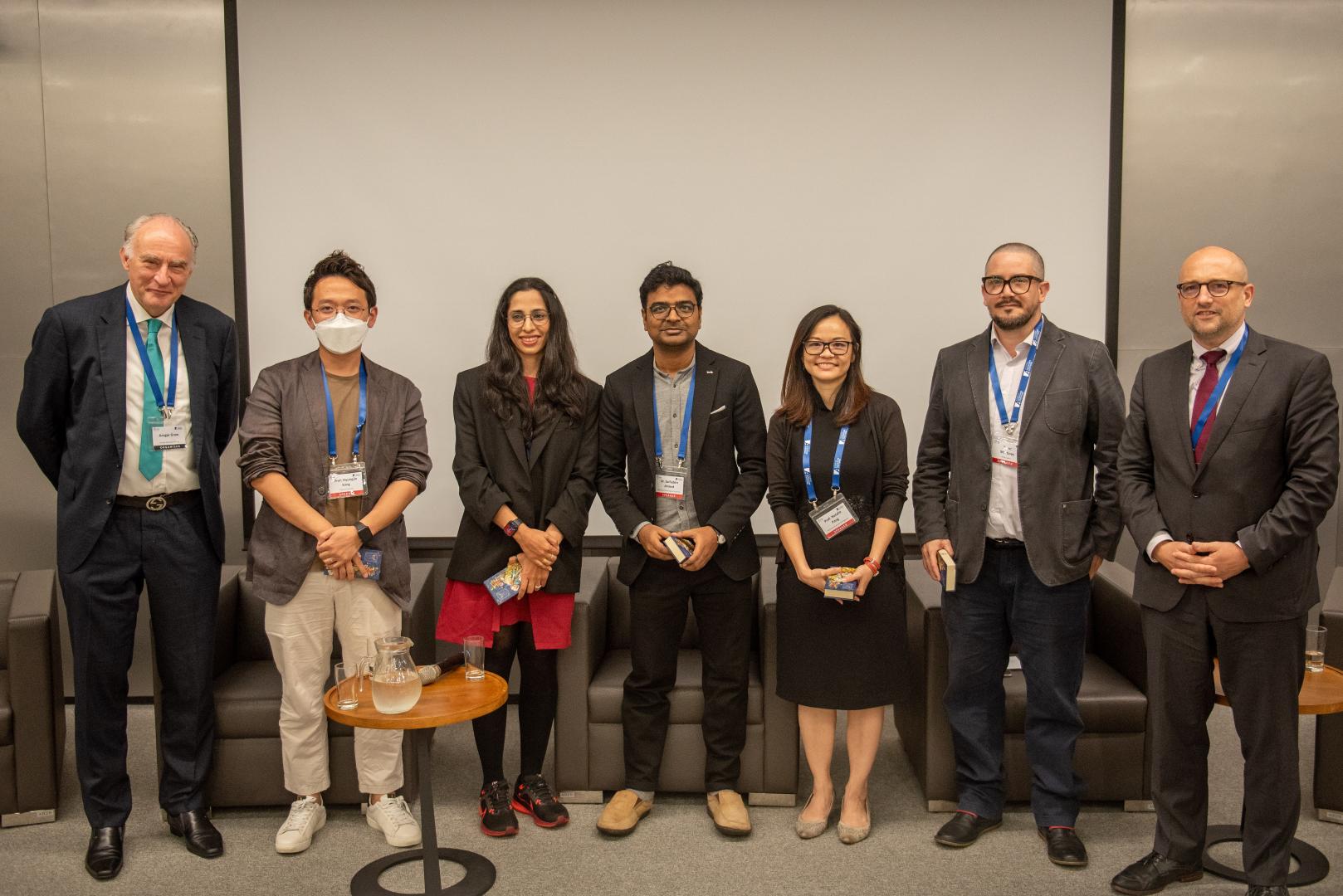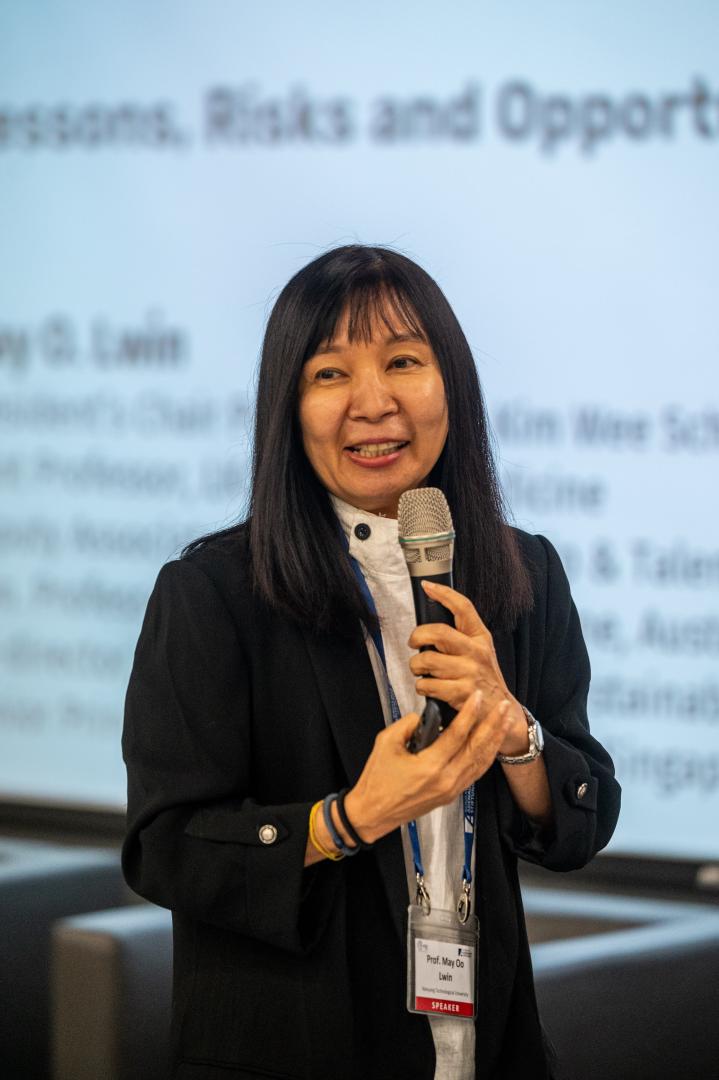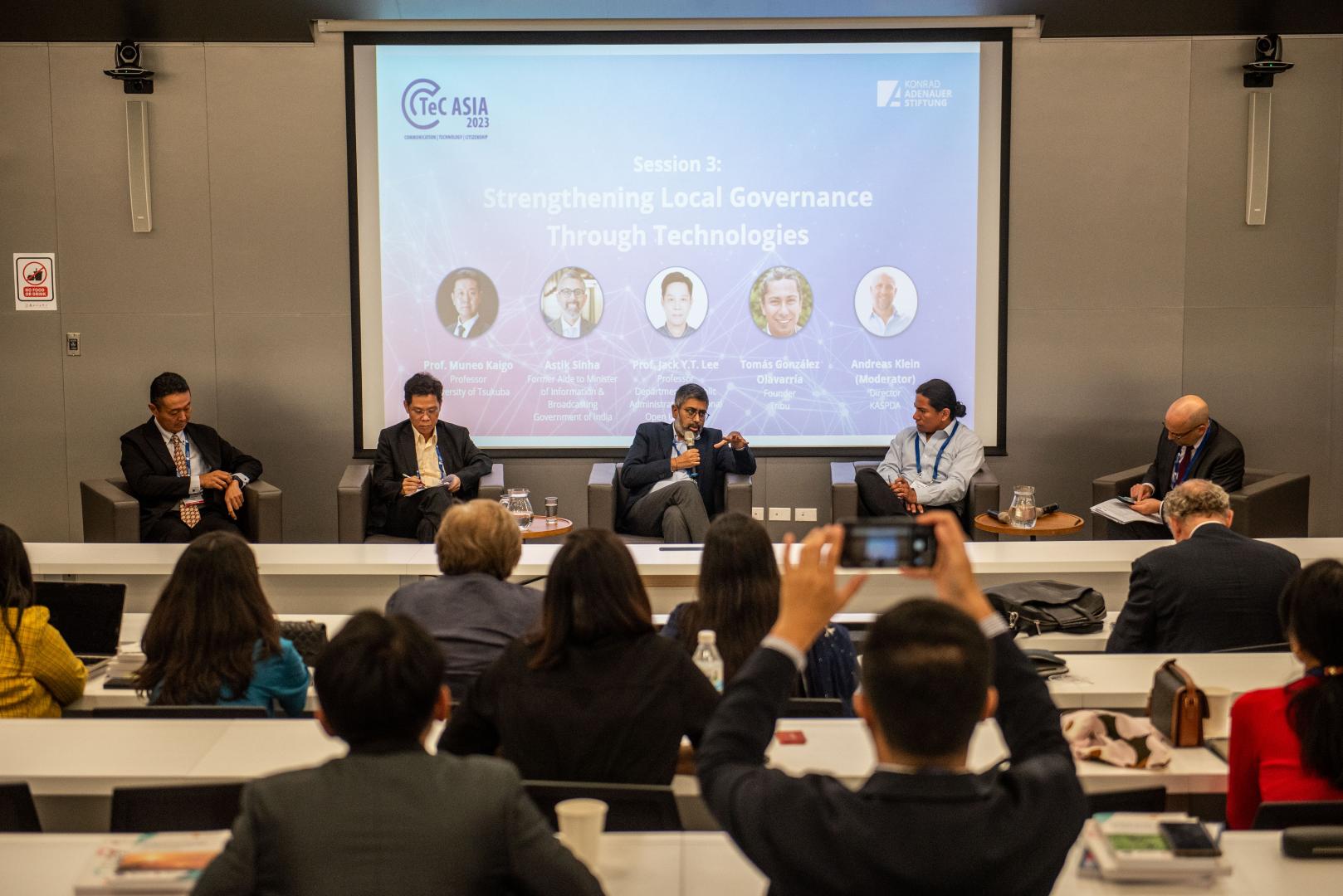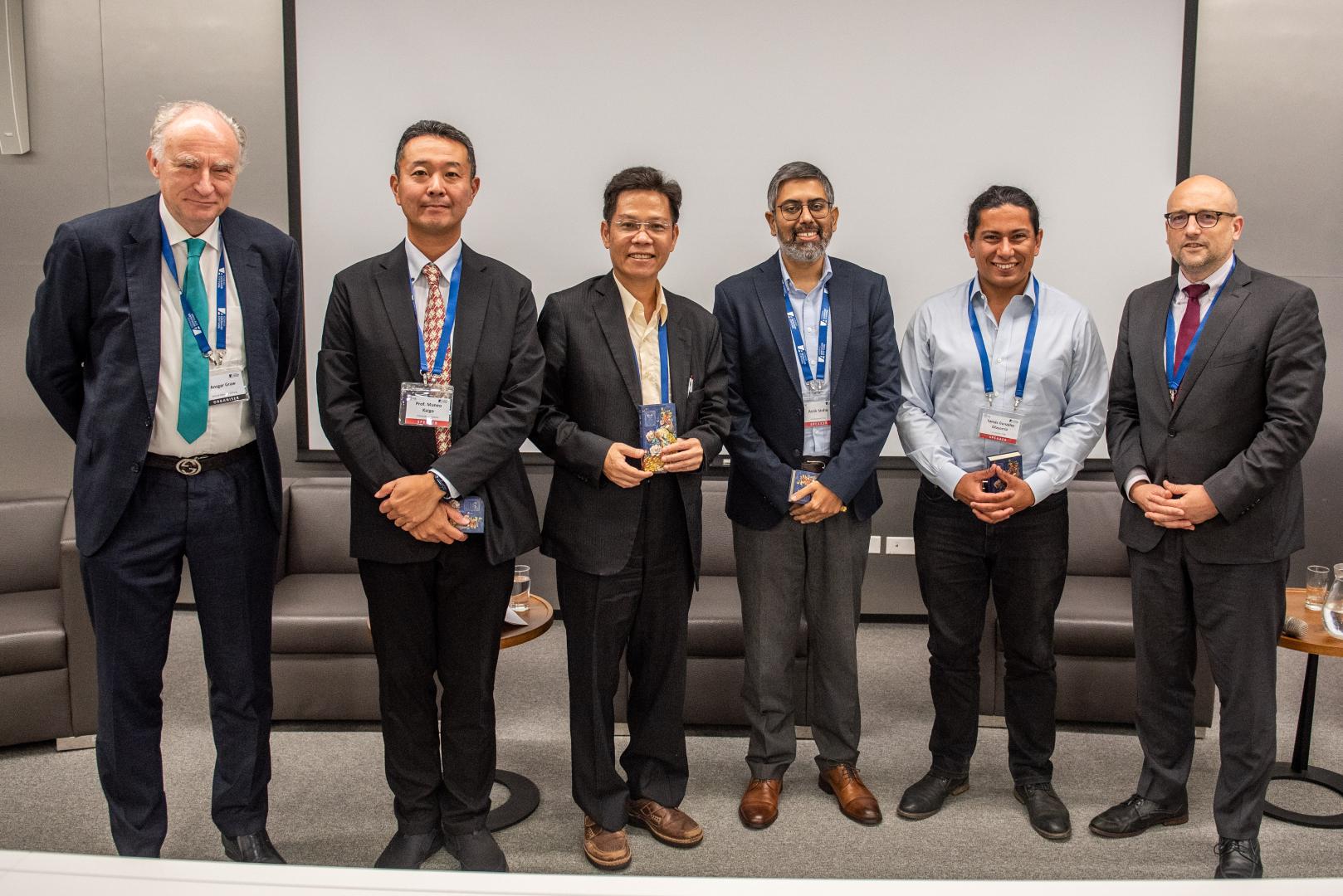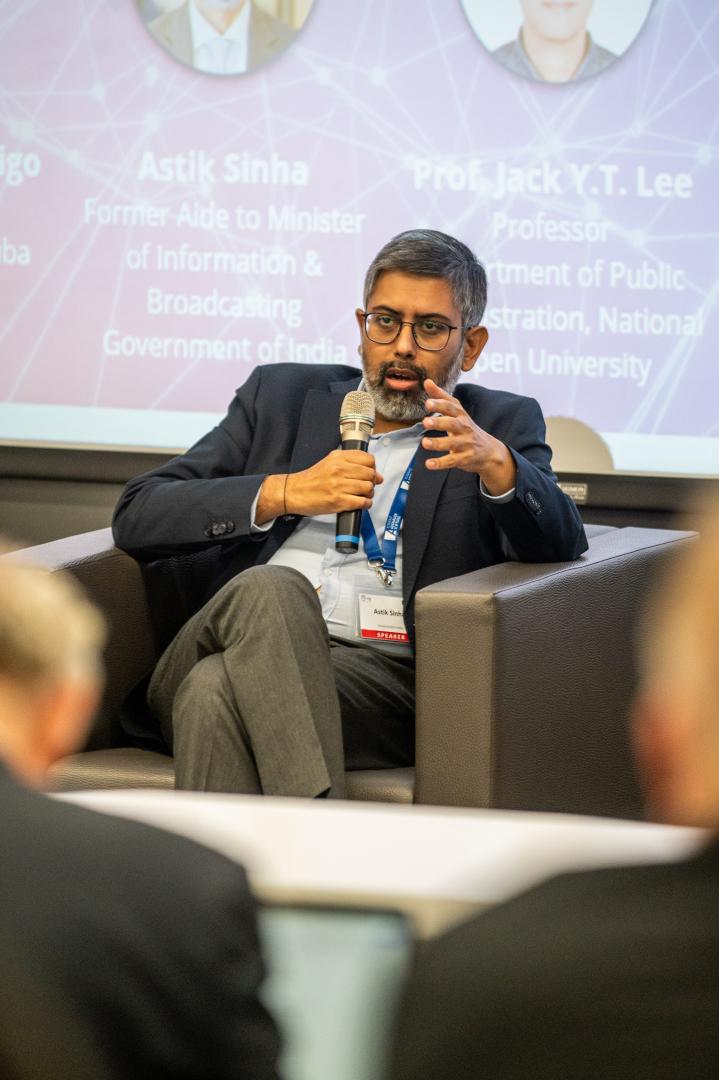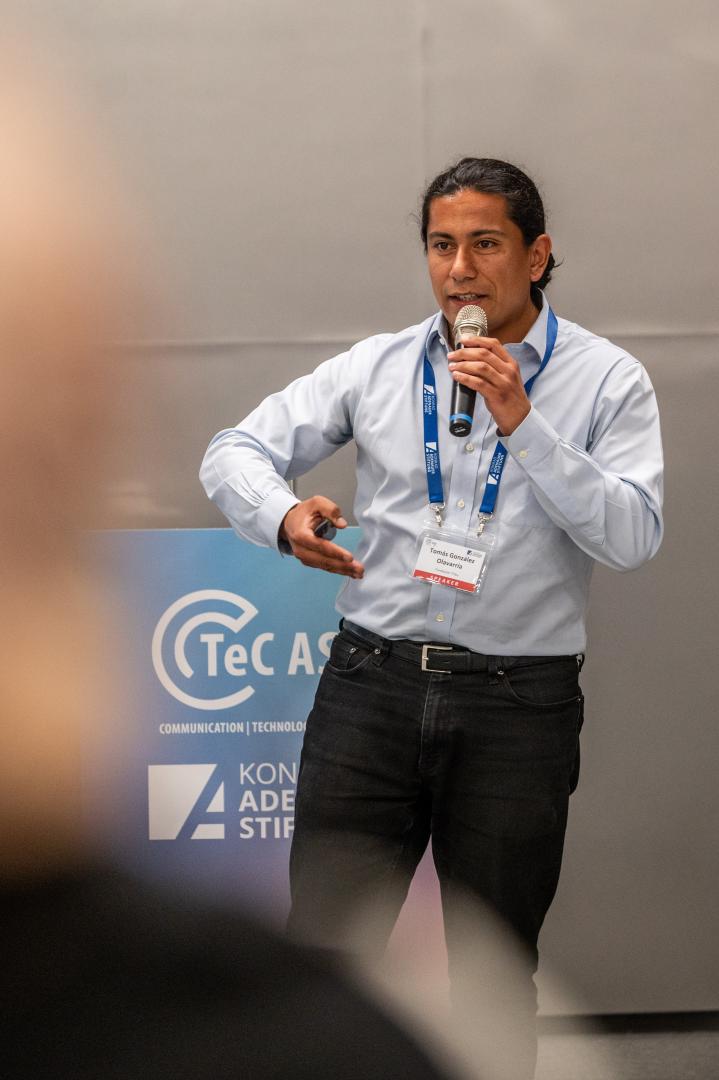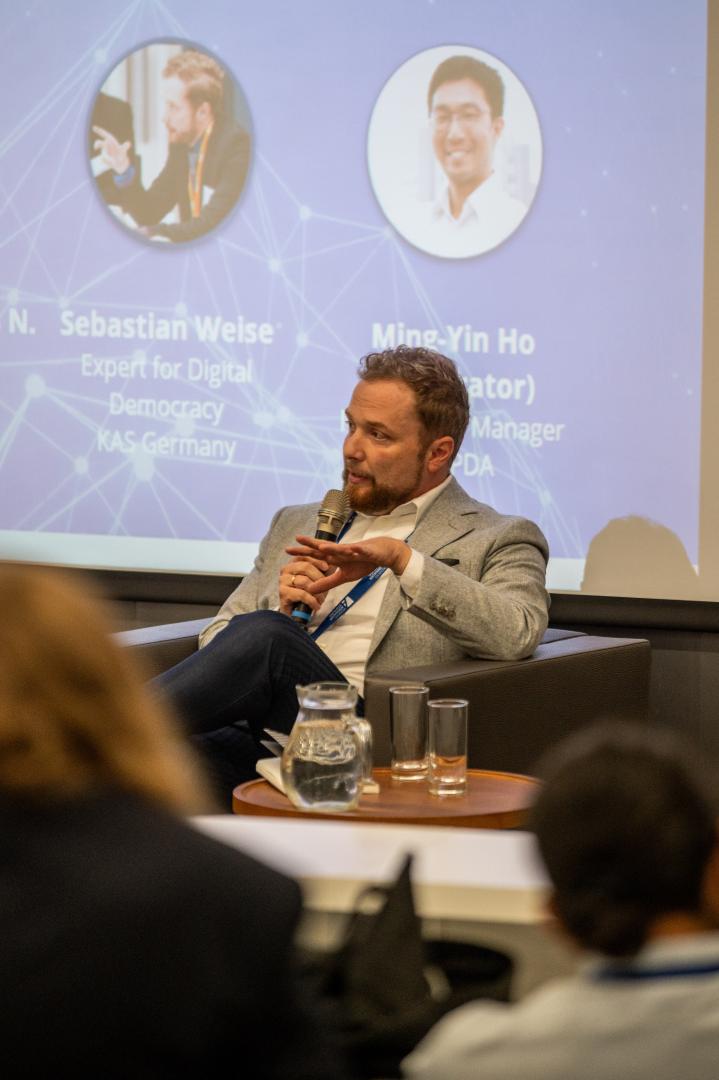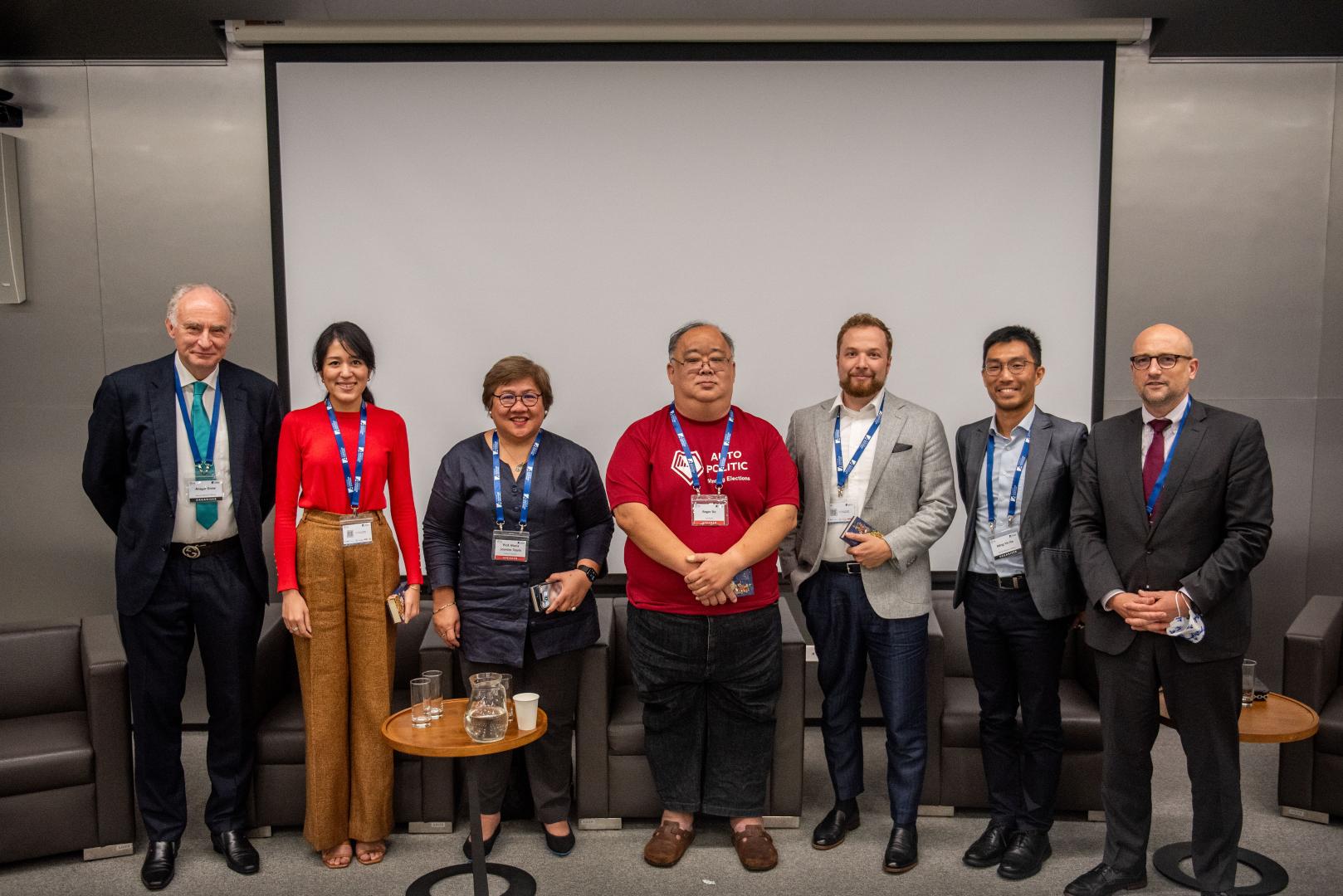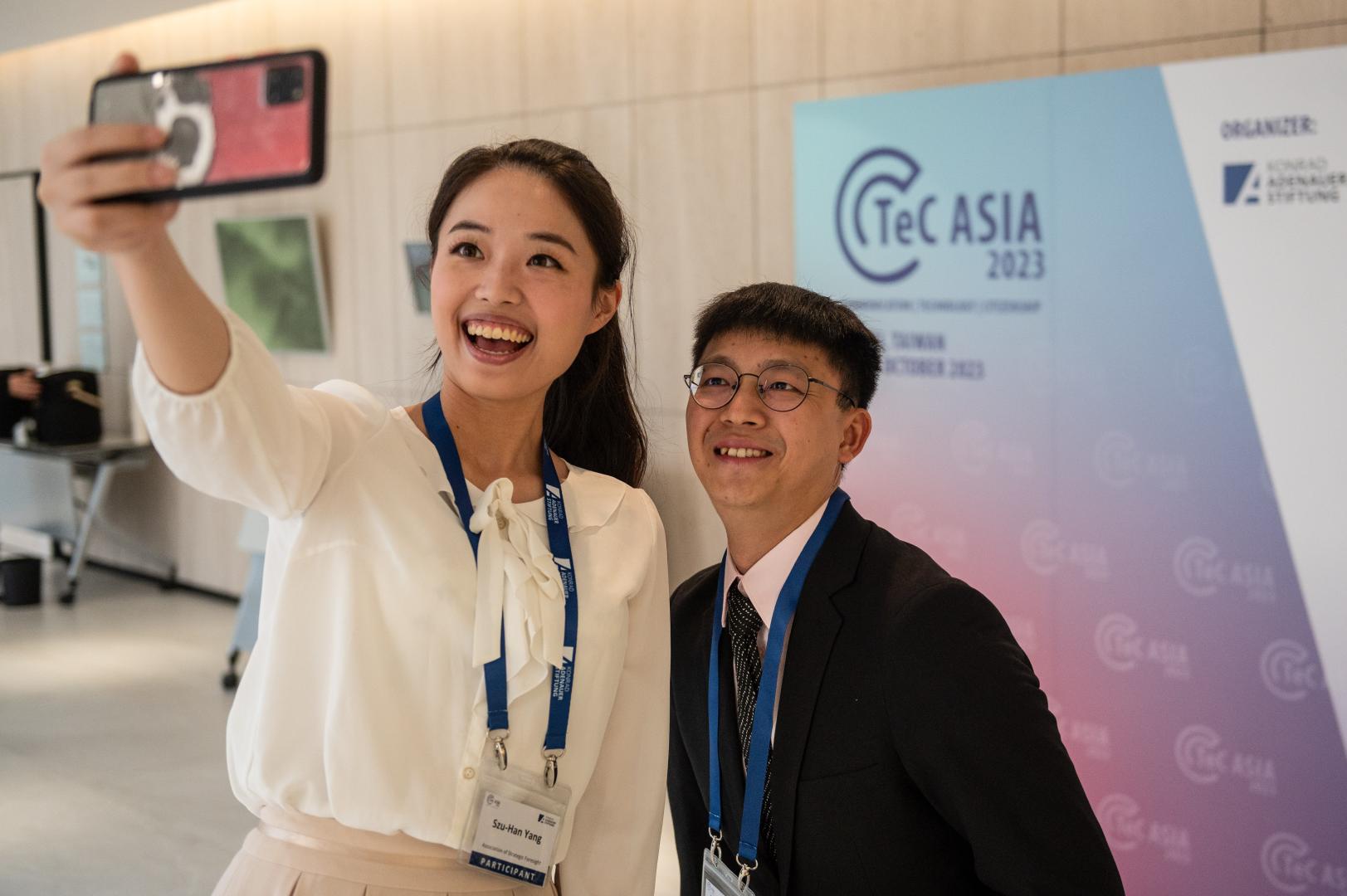Highlight
Keynote: Digital Media: A New Era of Blind Participation
Prof. Jörg Matthes, Professor at the Department of Communication at the University of Vienna
In the dynamic and overwhelming information landscape, social media has parked itself at the heart of the discussion. Driving major dialogues, campaigns and biases, it is ironically catering to blind spots that are causing more harm than good. Speaking on blind participation in the digital media space, Prof. Jörg Matthes, Professor at the Department of Communication at the University of Vienna, Austria said that, “the importance of understanding how people use social media not just for political participation but also for gaining knowledge about politics and current events”. He emphasized the distinction between "incidental exposure," where individuals come across political information they didn't intentionally seek, yet, this influences their learning. He further added that social media does increase political engagement, but this is primarily driven by motivational factors, such as emotional reactions, effective polarization, and network effects. However, the data presented showed that social media's impact on political knowledge and informed decision-making is limited. In some cases, it can even result in selective exposure and misinformation.
Prof. Matthes raised concerns about the potential consequences of social media on democratic processes, indicating that while engagement may be high, it may not be based on a solid foundation of political knowledge. He also acknowledged the dilemma that social media poses for democracy – it can lead to increased engagement but may not necessarily contribute to a well-informed and knowledgeable electorate.
Prof. Matthes brought forward a complex interplay between social media, political engagement, and learning, shedding light on both positive and negative aspects of this relationship.
-------------------------------------------------------------------------------------------------------------------------------
How emerging technologies are shaping (or destroying) democracy
The emergence of new technologies has presented both opportunities and challenges to governments around the world, as they try to come up with regulations that would create a safer online environment, often at the risk of individual freedoms. At this convergence where a new world is emerging with technology reshaping the lives of people, Dev Lewis, the Senior Research Fellow at Digital Asia Hub said, “we look at the long arc of history where we’re at, we have in some ways more agency than we ever had before and I think that should be acknowledged and that should be celebrated”. However, he stressed that this agency is sometimes a false agency because the information that shapes us and shapes how we see things is more and more controlled by algorithms which are controlled themselves by a small handful of corporations.
Dr. Carol Soon, principal research fellow at the Institute of Policy Studies at the National University of Singapore, drew attention to “online harms,” which, she said, diminishes the confidence of people in technology. “The issue of fairness and safety on the online space for everyone clearly is at threat because of online harms such as hate speech, cyber harassment, doxxing, CSEM (child sexual exploitation material), etc… And because of that, it has a huge impact on the kind of trust people put on technology or more importantly, the trust that people have in one another in different sectors of the community,” she said.
In response, governments such as China, India and Malaysia have passed various laws to regulate digital spaces. China has also been known to employ scrubbing, or the removal of videos online, and shadow bans where a social media platform bans a user’s content from showing up without notifying the user.
Prof. Marko Skoric, associate professor of the City University of Hong Kong, said some governments have done this without even the need for any law. But for groups like the Asia Citizen Future Association, this has led to a shrinking civic space particularly in the Southeast
Asian region. “Technology serves the goal of the powerful which are maybe corporations and the government,” the group’s executive director, Leah Wen-Liang Lin, said. This group is advocating for Taiwan to serve as an alternative civic space to Southeast Asian countries.
Dr. Soon said governments face the challenge of protecting people’s safety while respecting their freedom of speech. “How do we find the balance?”, she asked. Her suggestion: efforts must be transparent, localized and done in collaboration with stakeholders.
-------------------------------------------------------------------------------------------------------------------------------
Going Beyond Misinformation: Faking the Future
The rise of more complex technologies has exacerbated the threat of misinformation and disinformation. Several researches show that while internet and social media users are aware of the prevalence of fake news online, users still find it challenging to distinguish what is real and what is not.
Dr. Saifuddin Ahmed, assistant professor at the Nanyang Technological University mentioned that the effect of deepfakes and the ability to detect deepfakes have become concerning.
“You’d expect that they would want to know more about deepfakes once they see it… But with each exposure, they tend to believe it more,” Ahmed said.
A study by Professor Hyunjin Song from the Yonsei University in South Korea demonstrated that while “people change their attitudes when they see that fact checked information,” users still doubt the neutrality of vetted information.
“They change their attitude but at the same time they think that the information they see is biased,” he said.
Meantime, Dr. Kokil Jaidka, assistant professor at the National University of Singapore, discouraged the use of chatbots as a replacement for search engines and other research tools.
“Language models are mindless mimics… They do not know what they are saying and they cannot reason,” she said, citing data from her research on ChatGPT.
“The bias is coming from the source of information. The information these models are built on are white-centric, English-centric,” she added.
For Chile-based journalist Tomas Martinez, collaboration between different civic society institutions can help improve the quality of fact checking across spheres and industries.
-------------------------------------------------------------------------------------------------------------------------------
Keynote: Equity and Misinformation in the Post-Pandemic Global Health Landscape: Opportunities and Risks
Prof. May O. Lwin, Chair, Wee Kim Wee School of Communication and Information, Nanyang Technological University (Singapore)
The world was hit by the COVID-19 pandemic for over 3 years. During that time, misinformation offered unique challenges and dangers to the public.
Prof May O. Lwin, Chair and President’s Chair at Nanyang Technological University, warned that when misinformation is highly prevalent, people get confused and polarized, and it certainly has an impactful consequence which leads people to have irrational behaviors.
Lwin found in her studies that during COVID-19, the amount of misinformation is much larger than in the previous health crisis.
She compared the Zika virus epidemic in 2017 with COVID-19 and noted that people on social media usually spread the same information as what the government or health authorities informed in 2017.
However, during COVID-19, only very little content was aligned with information from the government.
“Unfortunately, a lot of information was coming from somewhere else and a large portion were different types of disinformation,” Lwin said.
She tracked how misinformation affected physical mobility and how it would lead to irrational behaviors of the population and gave an example of panicking about buying toilet paper during COVID-19 which was triggered by misinformation on social media.
Although social media has become a main platform of spreading misinformation, Lwin is positive about how social media could help during the pandemic or any crisis.
For example, migrant workers in Singapore received accurate health information from the government. And for the authorities, they can inform the specific group of people according to their needs.
Lwin urged the countries and health authorities to integrate fake news management, risk assessment that considers misinformation, and Al integration in arenas such as health crisis response planning, vaccine hesitancy, and public health messaging.
Lwin emphasized that it is important for the authorities, academics, digital companies, and the public to work together and prepare for future pandemics or other crises. “We need to collect all the possible misinformation now and get prepared,” she said.
-------------------------------------------------------------------------------------------------------------------------------
Strengthening Local Governance Through Digitalisation
From mobile apps in India to welfare cards in Taiwan and Japan, local governments are resorting to digitalising government services in a bid to promote efficiency. Indians, for example, can use sectorial apps or service-based apps of platforms formulated to deliver services. They may also provide feedback through an app that goes straight to the office of the Prime Minister.
In Taiwan, a welfare card called Respected Elders Compassion Card is given to senior citizens while a similar card in Japan, called My Number card, can be used to pay taxes and apply for government services.
These were just some of the innovations made by selected governments that were shared during a session at the Communication Technology Citizenship Asia Conference 2023 in Taipei on Friday.
Representatives from India, Taiwan, Japan and Chile shared their local experiences.
But while the governments of India and Taichung in Taiwan had no problems in terms of acceptance by stakeholders, Japan had to address hesitation on the part of the Japanese, especially since the My Number card contains all the sensitive personal information of the bearer.
“Maybe people were very skeptical of who is going to handle this information, how is it going to be handled. Is this going to be secure? And we have sort of a sad history in the past of how citizens are being controlled by governments. So there’s a very deep skepticism towards it,” said Dr. Muneo Kaigo, a communication and media professor at the University of Tsukuba.
Launched in 2016, the card only had a penetration rate of 9% in 2017 and 16.4% in 2020, which meant, only a handful of its intended beneficiaries took part in the program.
It was only after the government offered monetary rewards that the penetration rate went up to 78.4% by October 1, 2023. It also penalized non-registration.
“For efficiency, this is very important. However, there are many caveats attached to this. There are many concerns. So I cannot really advocate that every nation try to implement this chip card and have it recorded. However, the efficiency that accompanies this card is tremendous. So that’s
where the government should decide and have a policy, however difficult to have strict protection measures,” Kaigo explained.
Tomas Gonzalez Olavarria, an economist and the founder and president of the NGO Fundación Tribu in Chile, stressed the importance of involving the stakeholders in every step of the way.
“The public should not only be involved in the initial part but also during the implementation…The feeling of ownership in the people increases the possibility that the project will continue,” he said.
-------------------------------------------------------------------------------------------------------------------------------
AI and the Future of Political Campaigning
The advent of artificial intelligence has been sending jitters through several sectors, including the political campaign industry as machines — which are faster and more accurate in churning and analysing data — may soon replace volunteers and strategists.
Pannika Wanich, a member of the executive committee of Thailand’s Progressive Movement, attested to the efficiency of using AI in political campaigns.
“AI has done a great job in designing political e-poster for political campaigns,” she said, noting that her party expects to detect target voters more easily thanks to machine learning.
AutoPolitic Founder Roger Do said “AI is substituting human labour with cheap technology.”
“In future elections, I believe AI will perfect its work and the deepfake that will be used in political campaigns will be most disastrous,” he added.
“AI is not good news because when parties no longer need volunteers to participate in a civil activity, we are no longer voters. We are consumers buying votership and paying for our freedom,” he said.
For PUBLiCAS Asia founder Maria Lourdes Tiquia, instead of fearing AI, campaigners should take advantage of this “tool for learning” that could enhance strategies.
“You can put data into political maps and it can tell you even before the campaign what your political strategies can be in order to become competitive,” she said.
“Anyone can leapfrog as long as you have data. If you do not have data, you cannot run. If you do not understand data then you cannot be competitive,” she added.
While volunteers may be limited to a certain degree, “those who have run campaigns will have a premium,” Tiquia said.
“The machine can do so much but how to roll it out is also another issue,” she said.
Sebastian Weise — Konrad Adenauer Stiftung’s expert for Democracy, Law and Political Parties — noted that “nearly every party is using AI, but there is really no party that exploits the use of AI completely.”
“What you need in the near future to run a political campaign is money,” he said.
“This will lead into a highly polarised society with actors that are trying to influence the elections on their own.”
-------------------------------------------------------------------------------------------------------------------------------



